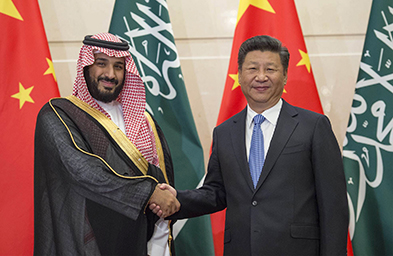
Saudi Arabia’s Crown Prince Mohammed bin Salman seen here with China’s President Xi Jinping in 2016 has cemented a $10 billion deal for a refining and petrochemical complex in China last month (Photo: Pool/Bandar Algaloud/Anadolu Agency)
Meng Yihua
Turkey recently broke its long-held silence to finally speak out against the Chinese Government’s treatment of the Uyghur Muslims in Xinjiang (East Turkestan), China’s far-western province. Meanwhile, the Organisation of Muslim Cooperation (OIC) commended China for “providing care to its Muslim citizens.”
To date, it seemed that Turkey’s President, Recep Tayyip Erdoğan, valued the country’s relationship with China more than the rights of the Uyghur people, who share cultural and linguistic similarities with Turkic ethnic groups. However, in a recent statement, Turkey’s Ministry of Foreign Affairs called the detention camps “a great shame for humanity” and called on the United Nations as well as the international community to act in the face of this crisis. This made Turkey one of the few Muslim-majority countries to criticise Beijing for its detention of ethnic Muslims.
Pressure from Indonesia and Malaysia have so far been the Uyghurs’ best hope, but Turkey’s entrance onto the international scene could signal a tipping point. Domestic pressure had been mounting within Turkey, with large-scale protests urging the Government to take action, and Government silence was also proving costly in political terms, particularly in the face of upcoming elections.
The key factor leading to Turkey’s statement, however, was rumours of the death of an influential Uyghur musician, Abdurehim Heyit, highly popular in Turkey as well as in China. It seems that his lyrics, tainted with proud Uyghur sentiments, captured the Chinese Government’s unwanted attention, leading to his arrest in 2017 and alleged recent death.
Chinese state media responded to Turkey by posting video recordings of Heyit online, showing him alive, but Turkey did not back down. This signals a noteworthy change in Turkish attitudes towards China, a country which, until recently, had been imagined as an ally of Turkey.
However, even in Indonesia and Malaysia, the ‘Uyghur issue’ is gaining traction, but with Indonesian elections looming in April, it is unclear how much of their anti-Beijing rhetoric stems from domestic politics as opposed to genuine concerns about human rights.
However, from the perspective of the potential 3 million Muslims that have been detained in the camps, any action regardless of motive is welcome. With more democratic political systems, the governments of Indonesia and Malaysia are more responsive to public pressure, unlike most other Muslim-majority countries, such as Pakistan, Iran and Saudi Arabia.
Meanwhile, 46th Session of the OIC on Muslim minorities conference in Abu Dhabi on March 1-2, Muslim countries in their resolution on treatment of Muslim minorities in China said they “Welcome(d) the outcomes of the visit conducted by the General Secretariat’s delegation upon invitation from the People’s Republic of China; commends the efforts of the People’s Republic of China in providing care to its Muslim citizens; and looks forward to further cooperation between the OIC and the People’s Republic of China.”
On his recent visit to Beijing to sign further trade deals, Saudi’s crown prince, Mohammed bin Salman, was quoted on Chinese state television as defending Beijing’s “right” to imprison Uyghur Muslims for the sake of their national security. Activists say the Saudi prince’s words affirm his support for the detention camps and signal his tacit approval to Beijing to continue their crackdown on the Uyghur Muslims.
Mohammed bin Salman had been the subject of intense lobbying campaigns by activist groups, who hoped that he would condemn Beijing’s treatment of the Uyghur Muslims. However, Saudi Arabia is not the only Muslim-majority country to have remained silent on the Uyghur persecution; before arriving in Beijing, Mohammed bin Salman visited Pakistan, where Prime Minister, Imran Khan, claimed he “did not know” much about the conditions of the Uyghur Muslims in China.